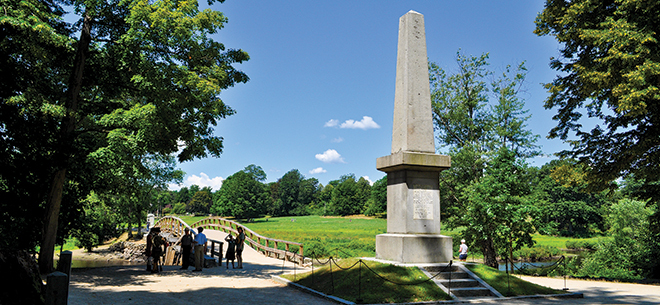Explore the area’s revolutionary past by visiting these sites critical to the birth of our nation

Minute Man National Historical Park
This is where the American Revolution officially began. Tour the well-preserved grounds where the Battles of Lexington and Concord took place in 1775, including such national treasures as the North Bridge (pictured), the locale where the so-called “shot heard ’round the world” was fired.
North Bridge Visitor Center: 174 Liberty St., Concord, 978-369-6993, nps.gov/mima
Faneuil Hall
Fiery anti-tax speeches by the likes of Samuel Adams were held under the roof of this newly renovated landmark, earning it the nickname the “Cradle of Liberty.”
Merchants Row and Faneuil Hall Square, 617-242-5642, nps.gov/bost
Bunker Hill Monument
On June 17, 1775, a pivotal early skirmish of the revolution was fought here. Although a loss for the rebels, it inflicted heavy damages on the British troops.
Monument Square, Charlestown, 617-242-5641, nps.gov/bost
The Liberty Tree
Marked by not one, but two plaques, the site of an elm—cut down by British soldiers in 1775—where early protests took place was also a gathering place for the Sons of Liberty.
Corner of Washington and Essex streets
Boston Tea Party Ships & Museum
Located in the Fort Point Channel near the now-buried Griffin’s Wharf where the famed protest took place, this facility hosts daily reenactments as well as a tea room serving beverages and tasty treats.
306 Congress St., 866-955-0667, bostonteapartyship.com
Old North Church
The city’s oldest church served as the signal tower that spurred Paul Revere on his famous ride the night of April 18, 1775.
193 Salem St., 617-858-8231, oldnorth.com
Old South Meeting House
This former church, constructed in 1729, hosted the meeting that precipitated the Boston Tea Party on December 16, 1773.
310 Washington St., 617-482-6439, oldsouthmeetinghouse.org
Old State House
In 1770, the Boston Massacre occurred outside its walls, while the Declaration of Independence was first read in Boston from its balcony.
206 Washington St., 617-720-1713, bostonhistory.org
Dorchester Heights Monument
This off-the-beaten-path memorial in South Boston marks the area where key fortifications were built during the Siege of Boston. Cannons transported from upstate New York were positioned here, effectively ending the British occupation of the city on March 17, 1776.
Thomas Park, nps.gov/bost
Boston Common
An encampment spot for both British and Colonial troops, the country’s oldest public park was also the site of the now-toppled Great Elm, under whose branches the Sons of Liberty allegedly met.
Visitor Center: 139 Tremont St., 617-536-4100, bostonusa.com


